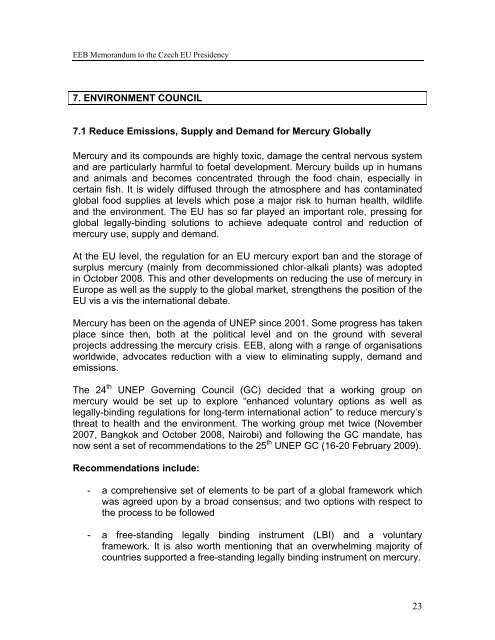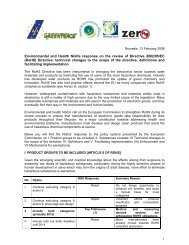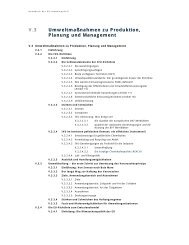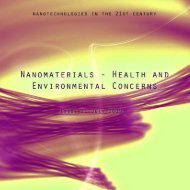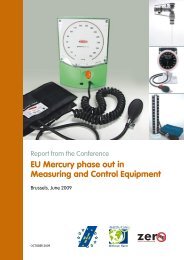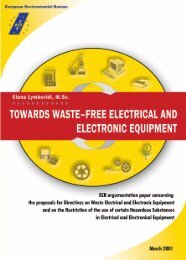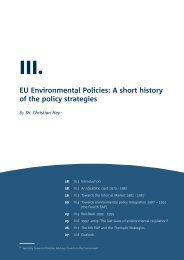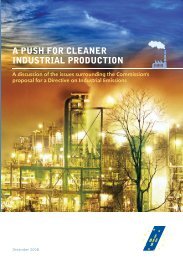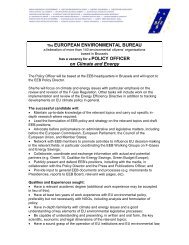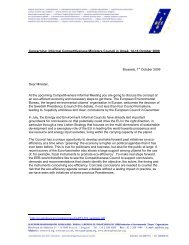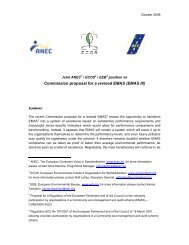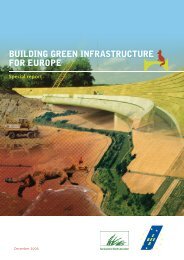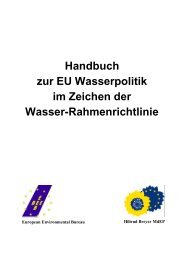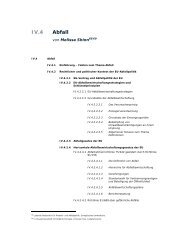Memorandum to Czech Presidency and Ten Test - EEB
Memorandum to Czech Presidency and Ten Test - EEB
Memorandum to Czech Presidency and Ten Test - EEB
- No tags were found...
Create successful ePaper yourself
Turn your PDF publications into a flip-book with our unique Google optimized e-Paper software.
<strong>EEB</strong> <strong>Memor<strong>and</strong>um</strong> <strong>to</strong> the <strong>Czech</strong> EU <strong>Presidency</strong>7. ENVIRONMENT COUNCIL7.1 Reduce Emissions, Supply <strong>and</strong> Dem<strong>and</strong> for Mercury GloballyMercury <strong>and</strong> its compounds are highly <strong>to</strong>xic, damage the central nervous system<strong>and</strong> are particularly harmful <strong>to</strong> foetal development. Mercury builds up in humans<strong>and</strong> animals <strong>and</strong> becomes concentrated through the food chain, especially incertain fish. It is widely diffused through the atmosphere <strong>and</strong> has contaminatedglobal food supplies at levels which pose a major risk <strong>to</strong> human health, wildlife<strong>and</strong> the environment. The EU has so far played an important role, pressing forglobal legally-binding solutions <strong>to</strong> achieve adequate control <strong>and</strong> reduction ofmercury use, supply <strong>and</strong> dem<strong>and</strong>.At the EU level, the regulation for an EU mercury export ban <strong>and</strong> the s<strong>to</strong>rage ofsurplus mercury (mainly from decommissioned chlor-alkali plants) was adoptedin Oc<strong>to</strong>ber 2008. This <strong>and</strong> other developments on reducing the use of mercury inEurope as well as the supply <strong>to</strong> the global market, strengthens the position of theEU vis a vis the international debate.Mercury has been on the agenda of UNEP since 2001. Some progress has takenplace since then, both at the political level <strong>and</strong> on the ground with severalprojects addressing the mercury crisis. <strong>EEB</strong>, along with a range of organisationsworldwide, advocates reduction with a view <strong>to</strong> eliminating supply, dem<strong>and</strong> <strong>and</strong>emissions.The 24 th UNEP Governing Council (GC) decided that a working group onmercury would be set up <strong>to</strong> explore “enhanced voluntary options as well aslegally-binding regulations for long-term international action” <strong>to</strong> reduce mercury’sthreat <strong>to</strong> health <strong>and</strong> the environment. The working group met twice (November2007, Bangkok <strong>and</strong> Oc<strong>to</strong>ber 2008, Nairobi) <strong>and</strong> following the GC m<strong>and</strong>ate, hasnow sent a set of recommendations <strong>to</strong> the 25 th UNEP GC (16-20 February 2009).Recommendations include:- a comprehensive set of elements <strong>to</strong> be part of a global framework whichwas agreed upon by a broad consensus; <strong>and</strong> two options with respect <strong>to</strong>the process <strong>to</strong> be followed- a free-st<strong>and</strong>ing legally binding instrument (LBI) <strong>and</strong> a voluntaryframework. It is also worth mentioning that an overwhelming majority ofcountries supported a free-st<strong>and</strong>ing legally binding instrument on mercury.23


